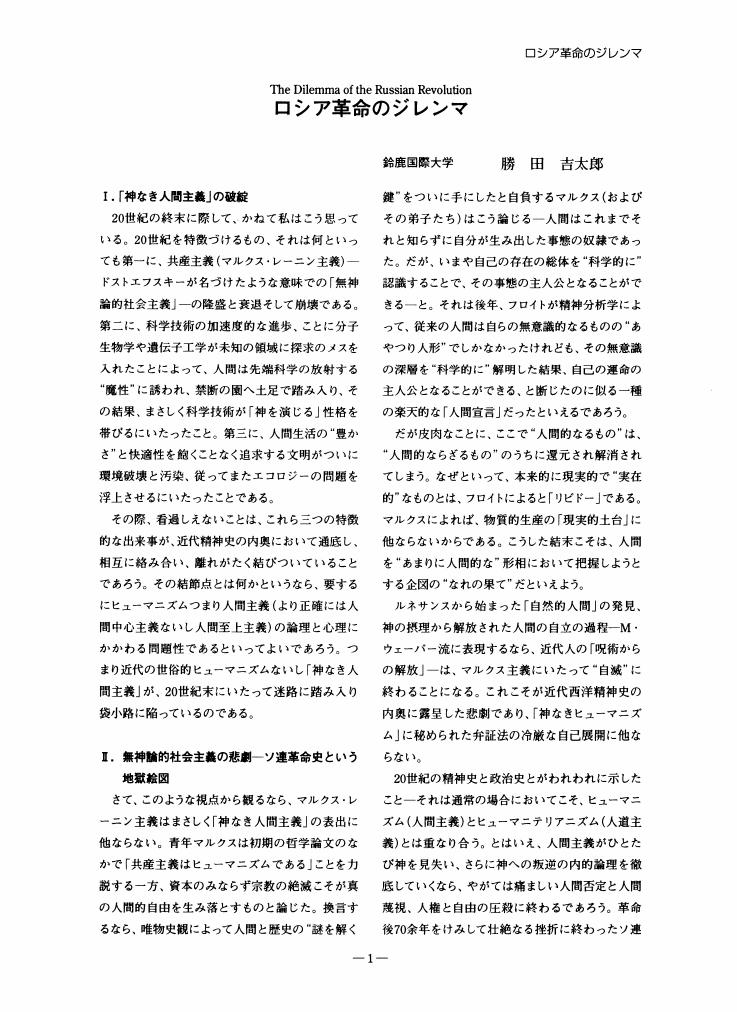15 0 0 0 OA バクーニンの革命論
- 著者
- 勝田 吉太郎
- 出版者
- 北海道大学スラブ研究センター
- 雑誌
- スラヴ研究(Slavic Studies) (ISSN:05626579)
- 巻号頁・発行日
- vol.3, pp.7-65, 1959
4 0 0 0 OA ロシア革命のジレンマ
- 著者
- 勝田 吉太郎
- 出版者
- ロシア・東欧学会
- 雑誌
- ロシア・東欧学会年報 (ISSN:21854645)
- 巻号頁・発行日
- vol.1999, no.28, pp.1-4, 1999 (Released:2010-05-31)
- 著者
- 勝田 吉太郎
- 出版者
- 京都大学法学会
- 雑誌
- 法学論叢 (ISSN:03872866)
- 巻号頁・発行日
- vol.82, no.2, pp.101-153, 1968-01
3 0 0 0 IR バクーニンの革命論
- 著者
- 勝田 吉太郎
- 出版者
- 北海道大学
- 雑誌
- スラヴ研究 (ISSN:05626579)
- 巻号頁・発行日
- vol.3, pp.7-65, 1959
The leitmotif of this article is to compare Bakuninism with Marxism in terms of their philosophical and sociological foundations as well as of their revolutionary programmes and tactics. In a word, the basic pathos of Marxism is Equality, and it starts with the society, whereas Bakunin's is Liberty and he starts with the individual. Indeed, his social and political theory begins, and almost ends, with liberty. That is why Bakunin's criticism of "the dictatorship of proletariat" is so severe and uncompromising. It may be said that his "apolitism" and the rejection of legal political action lead to the syndicalist ideas. Marx introduced into the revolutionary theory and practice the order, method, and authority, and thereby laid the foundation of the disciplined revolutionary State, Bakunin was a visionary and a romantic. His concern was not with the mass but with the individual, not with institutions but with morality. On the other hand, the combination between the Russian reality and his unrealism is peculiar enough. The paradox of history shows us that Lenin owes more to that rebel of the eastern backward country rather than to his official teacher, Karl Marx in formulating his own revolutionary tactics.(Particulary in his theory of "smychka" between workers and peasants and also his concept of the revolutionary party organization.) At all events, Bakunin's ideas, with his all fantasies and Narodnik biases, are deep-rooted in the Russian soil.
1 0 0 0 OA ソ連独裁制の将来
- 著者
- 勝田 吉太郎
- 出版者
- THE JAPANESE ASSOCIATION FOR RUSSIAN AND EAST EUROPEAN STUDIES
- 雑誌
- ソ連・東欧学会年報 (ISSN:03867226)
- 巻号頁・発行日
- vol.1977, no.6, pp.2-9, 1977 (Released:2010-03-16)
- 被引用文献数
- 1 1
1 0 0 0 OA ロシヤ帝国主義のイデオロギーとしての汎スラヴ主義
- 著者
- 勝田 吉太郎
- 出版者
- JAPANESE POLITICAL SCIENCE ASSOCIATION
- 雑誌
- 年報政治学 (ISSN:05494192)
- 巻号頁・発行日
- vol.12, pp.57-89, 1961-04-26 (Released:2009-12-21)
- 著者
- 勝田 吉太郎 三浦 小太郎
- 出版者
- 文芸春秋
- 雑誌
- 諸君 (ISSN:09173005)
- 巻号頁・発行日
- vol.41, no.4, pp.136-151, 2009-04
1 0 0 0 プルードン ; バクーニン ; クロポトキン
- 著者
- 猪木正道 勝田吉太郎責任編集
- 出版者
- 中央公論社
- 巻号頁・発行日
- 1980
1 0 0 0 プルードン ; バクーニン ; クロポトキン
- 著者
- 猪木正道 勝田吉太郎責任編集
- 出版者
- 中央公論社
- 巻号頁・発行日
- 1967



